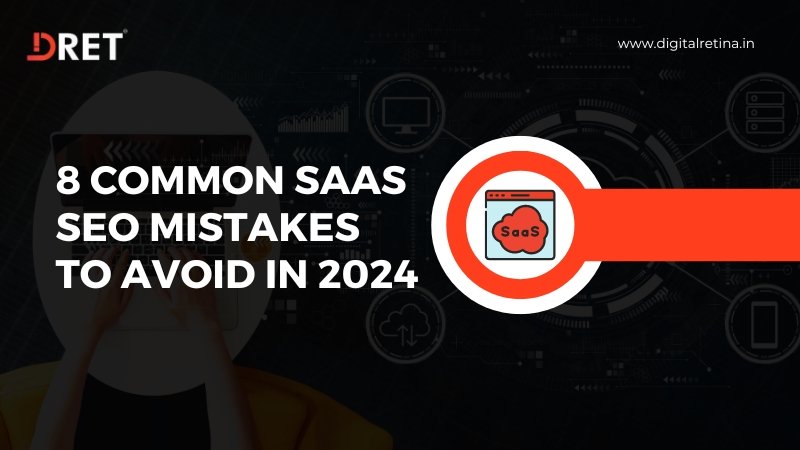
Avoid These 8 Common SaaS SEO Mistakes in 2024
- By digitalretina
- No Comments
- Post Views: 254

As the SaaS industry continues to grow, so does the competition for online visibility. Effective SEO is crucial for SaaS companies to stand out and attract potential customers. However, many businesses fall into common pitfalls that can hinder their SEO efforts. Here are eight common SaaS SEO mistakes to avoid in 2024, along with ways to avoid them.
1. Ignoring Keyword Research
Mistake: Failing to conduct thorough keyword research can lead to targeting irrelevant or overly competitive keywords, resulting in poor search rankings and low traffic. Without proper keyword research, your content might not reach the intended audience, causing a significant drop in organic traffic and engagement.
Ways to Avoid This Mistake:
Use Tools: Utilize tools like Google Keyword Planner, SEMrush, and Ahrefs to identify relevant keywords. These tools help you understand what terms your target audience is searching for and the competitiveness of those keywords.
Focus on Long-Tail Keywords: Prioritize long-tail keywords that closely match your target audience’s search intent. Long-tail keywords are less competitive and more specific, making it easier to rank higher in search results.
Update Your Strategy Regularly: Regularly update your keyword strategy based on current trends and data analysis. SEO is not a one-time task but an ongoing process that requires constant adaptation to changes in search behavior and market dynamics.
2. Neglecting On-Page SEO
Mistake: Overlooking on-page SEO elements such as title tags, meta descriptions, headers, and image alt texts can negatively impact your search rankings.
Ways to Avoid This Mistake:
Ensure each page has a unique title tag and meta description with targeted keywords.
Utilize header tags (H1, H2, H3) to organize your content effectively and incorporate keywords in a natural manner.
Optimize images with descriptive alt texts and filenames.
3. Poor Quality Content
Mistake: Publishing low-quality, irrelevant, or thin content can result in high bounce rates and poor user engagement, negatively impacting your SEO performance. Quality content is essential for attracting and retaining visitors, which boosts your site’s authority and rankings.
Ways to Avoid This Mistake:
Create High-Quality Content: Focus on producing informative, engaging, and valuable content that addresses your audience’s pain points and interests. This will keep visitors on your site longer and encourage return visits.
Use a Content Calendar: Maintain a content calendar to ensure regular posting and consistency. Planning your content schedule helps in keeping your website fresh and relevant.
Incorporate Various Content Formats: Use a mix of blog posts, infographics, videos, and case studies to cater to different audience preferences and enhance engagement. Different formats can keep your content dynamic and appealing.
4. Ignoring Mobile Optimization
Mistake: With the increasing use of mobile devices, neglecting mobile optimization can lead to a poor user experience and lower search rankings.
Ways to Avoid This Mistake:
Use responsive web design to ensure your site adapts to different screen sizes.
Optimize page load speed by compressing images and using efficient coding practices.
Test your website on various mobile devices to ensure a seamless user experience.
5. Lack of Technical SEO
Mistake: Overlooking technical SEO aspects such as site speed, XML sitemaps, and structured data can significantly hinder search engine crawling and indexing. Technical SEO is essential for ensuring search engines can effectively access, crawl, interpret, and index your website content.
Ways to Avoid This Mistake:
Conduct Regular Site Audits: Use tools like Google Search Console and Screaming Frog to perform regular site audits. These audits help identify and fix technical issues that could affect your site’s SEO performance.
Clean, Crawlable Structure: Ensure your website has a clean, crawlable structure with proper internal linking. This helps search engines navigate and understand your site content more efficiently.
Implement Structured Data: Use structured data to provide search engines with detailed information about your content. Structured data enhances search engine understanding and can improve the visibility of your site through rich snippets and other advanced search features.
6. Not Building Quality Backlinks
Mistake: Focusing solely on content creation without building high-quality backlinks can limit your website’s authority and search rankings. Backlinks are crucial for signaling to search engines that your site is credible and authoritative.
Ways to Avoid This Mistake:
Develop a Link-Building Strategy: Create a comprehensive strategy that includes guest posting, outreach, and partnerships. Engaging with industry-related websites and blogs can help you acquire valuable backlinks.
Create Shareable Content: Produce high-quality, engaging content that naturally attracts backlinks. Content that is informative, unique, and valuable is more likely to be shared and linked to by other sites.
Monitor Your Backlink Profile: Regularly check your backlink profile to ensure the quality of your links. Use tools like Ahrefs or Moz to identify and disavow any low-quality or spammy links that could harm your SEO performance.
7. Overlooking User Experience (UX)
Mistake: Ignoring UX factors such as site navigation, design, and accessibility can lead to high bounce rates and lower search rankings.
Ways to Avoid This Mistake:
Create a website with intuitive navigation and a clear, logical structure. Make sure your website is fully accessible, catering to all users, including those with disabilities.
8. Failing to Monitor and Analyze Performance
Mistake: Not regularly monitoring and analyzing your SEO performance can prevent you from identifying issues and making necessary improvements. This oversight can lead to missed opportunities and declining search rankings.
Ways to Avoid This Mistake:
Use Analytical Tools: Leverage tools like Google Analytics and Google Search Console to track your SEO performance. These tools provide insights into your site’s traffic, user behavior, and other key metrics.
Set Up Regular Reporting: Establish regular reporting to monitor essential metrics such as organic traffic, bounce rates, and conversion rates. Consistent reporting helps track progress and identify areas needing attention.
Refine Strategy Continuously: Based on the data and insights gathered, continuously refine and adapt your SEO strategy. This ongoing optimization ensures that your approach remains effective and aligned with current trends and user behavior.
In conclusion
Avoiding these common SaaS SEO mistakes can significantly improve your online visibility and attract more potential customers. By conducting thorough keyword research, optimizing on-page and technical SEO elements, creating high-quality content, and focusing on user experience, you can enhance your SEO performance and stay ahead of the competition. Regularly monitor your performance and adapt your strategy to ensure long-term success in the ever-evolving world of SEO.
If you need expert help in fixing these mistakes, contact Digital Retina. We offer personalized consultations to transform your SEO strategy and deliver outstanding results.
digitalretina

Brand Architect's Growth Engineer


Comprehensive Guide to PPC Strategies: How to Make the Most of Your Paid Advertising

